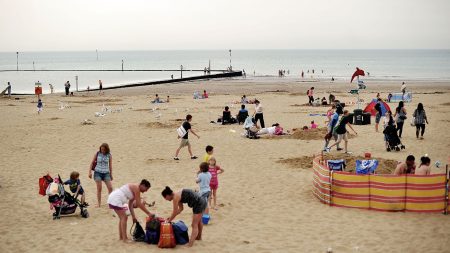Ryanair, the budget airline known for its competitive fares, has announced the cancellation of all flights to and from Aalborg, Denmark, effective from the end of March 2025. This decision comes in response to the Danish government’s newly introduced aviation tax, which adds a 50DKK (£5.57) fee per departing passenger. This tax, paid by the airlines, has made the Aalborg route unsustainable for Ryanair. The cancellation is a significant blow to UK travellers, particularly those using the London Stansted to Aalborg route, which currently offers fares as low as £14.99. This leaves no direct flight options from the UK to Aalborg, forcing travellers to seek alternative routes with connecting flights through hubs like Amsterdam or Copenhagen, significantly increasing travel costs.
The impact of the Danish aviation tax extends beyond the Aalborg route. Ryanair has also confirmed the closure of its base at Billund Airport, another Danish airport, resulting in the cancellation of 32 routes and a reduction of 1.7 million seats. This highlights the wider implications of the tax on Ryanair’s operations within Denmark. The airline has expressed its disappointment, attributing the closures directly to the government’s “short-sighted” decision, claiming it leaves them no other alternative. The loss of these routes will undoubtedly impact both business and leisure travellers, limiting accessibility and potentially hindering tourism to these Danish regions.
Aalborg, Denmark’s fourth-largest city, has previously garnered accolades for its high quality of life and happiness ranking. The flight cancellations will make reaching this city more complex and expensive for international travellers. Currently, the most affordable alternative involves connecting flights, starting at £81 each way. This substantial price increase effectively removes a budget-friendly travel option for many, potentially impacting tourism and economic activity in Aalborg. The lack of direct flights presents a significant hurdle for travellers, requiring additional planning, longer journey times, and increased expenditure.
Ryanair’s response to rising taxes extends beyond Denmark. The airline has also cancelled its Bournemouth to Agadir route in Morocco. This route, launched only recently in April 2024, was the 19th new destination added to Bournemouth Airport’s network. The cancellation is attributed to the impending increase in Air Passenger Duty (APD) fees, set to rise by 15% on most flights starting April 2026. This highlights the cumulative impact of escalating aviation taxes on airlines’ route planning and profitability, leading to service reductions and potentially hindering the development of new travel connections.
Despite these cancellations, Ryanair has announced five new routes originating from London Stansted Airport. These routes, including flights to Reggio Calabria (Italy), Linz (Austria), Clermont-Ferrand (France), Munster (Germany), and Lubeck (Germany), suggest a strategic shift in the airline’s network, focusing on alternative destinations with potentially more favourable operating conditions. The launch of these new routes underscores Ryanair’s ongoing efforts to expand its network and offer travellers diverse destinations, despite the challenges posed by increasing taxes and charges in certain markets.
While expanding its network in some areas, Ryanair maintains its strict baggage policy. Passengers are allowed a small personal bag that fits under the seat, with specific size restrictions. Larger cabin bags are subject to hold baggage fees, which can be substantial if not pre-booked. Furthermore, airport check-in incurs an additional fee, encouraging passengers to utilize online check-in to avoid these added costs. These policies, while potentially frustrating for some travellers, are central to Ryanair’s low-cost operating model, allowing them to offer competitive fares. The airline also offers premium seating options, such as extra legroom seats and priority boarding, providing choices for passengers willing to pay for added comfort and convenience.





![Ryanair Discontinues All Direct UK Flights to [City Name] Starting Next Month.](https://tribunetimes.co.uk/wp-content/uploads/2025/02/beauvais-airport-ryanair-plane-waiting-968439538-1536x864.jpg)





